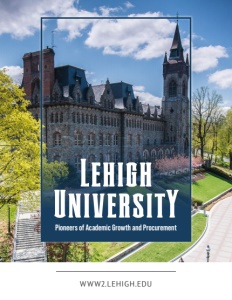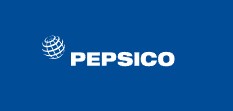Lehigh University
Pioneers of Academic Growth and Procurement
Proper policy and planning set the foundation for supply chain success in higher education
When dealing with higher education, a university’s success hinges not only on academic excellence but also on the efficiency of its supply chain procurement and management. Collaborative partnerships with vendors also ensure access to quality goods and services while upholding ethical standards.
At its core, success in supply chain procurement and management transforms a university into a well-oiled machine, where resources are optimized, and operations run seamlessly.
Pulling this off, admittedly, can be a challenge for many. However, for Lehigh University, a procurement strategy of this caliber is quite literally business as usual.
This university’s back-end supply chain and procurement operations have cultivated a reputation for reliability and sustainability, attracting top-tier faculty, students, and partners.
Moreover, Lehigh’s efficient supply chain practices contribute to cost savings, allowing the university to allocate resources strategically toward academic initiatives and campus development.
By prioritizing efficiency, transparency, and collaboration, the university not only thrives in the competitive higher education landscape but also sets the standard for excellence in procurement practices.
Lehigh Campus Developments
Nestled in Bethlehem, Pennsylvania, Lehigh boasts a prime location between the vibrant cities of New York City and Philadelphia, offering students the charm of a small-town atmosphere with access to metropolitan opportunities.
Founded by Asa Packer, its picturesque campus is steeped in history and innovation, spread across three distinct locations: the Asa Packer campus, the Mountaintop campus, and the Goodman campus.
The university is renowned for its high-quality engineering programs, however, it has also firmly established itself in other fields.
Most notably, its most recent expansions include the establishment of a College of Health and curriculum advancements in executive business education. Fortunately, for both students and faculty alike, Lehigh’s developments also include the renovation of its already existing spaces.
For example, renovation projects, such as the ongoing revitalization of the Clayton University Center (CUC), underscore Lehigh’s commitment to enhancing student experiences and facilities.
The student-focused center is slated to open for the Fall 2025 semester and is a fantastic renovation that will create a dynamic new environment for students.

Director of Purchasing Services Jane Altemose
The CUC renovation, along with the many other changes coming to the university, is part of a larger 10-year strategic plan focusing on innovation, risk-taking, addressing important intellectual and societal challenges, and cultivating collaborations and partnerships that amplify Lehigh’s global and regional impact.
“We’re still gathering information about how we’re going to prioritize strategic initiatives, but we have highly capable teams working on that and are pulling in subject matter experts to figure out how we’re going to implement those [changes] across campus,” says Director of Purchasing Services Jane Altemose.
Campus Procurement and Supply Chain Optimization
Lehigh’s procurement practices revolve around a decentralized operating model. The university empowers departments with buying authority while providing guidance, tools, and technology for efficient procurement.
However, a decentralized procurement model requires a high degree of collaboration and organization between both the university’s departments and its suppliers to ensure that nothing slips through the cracks.
According to Altemose, Lehigh’s Purchasing Services department has “a clearly defined business plan with goals and objectives that align to the university’s educational mission and strategic initiatives.”
The university creates that alignment via open lines of communication and inclusion for stakeholders through meetings, campus updates, focus groups, and ongoing programmatic discussions.
Partnerships with vendors are carefully cultivated, with emphasis on criteria like environmental responsibility, fair labor practices, and transparency.
To ensure it is selecting the best suppliers, the university conducts a Request for Proposal process, defining comprehensive requirements for the services it seeks to procure.
This process is used to vet a supplier’s capacity to meet Lehigh’s timelines, their experience in higher education, proximity, the experience of the supplier’s team, their sustainability practices, safety standards, financial health, diversity equity, and inclusion efforts, technology and innovation, risk management, and many other factors.
Because of this thorough screening process, Lehigh has cultivated relationships with some of the highest-quality vendors and suppliers. For example, the university granted Pepsi exclusive pouring rights to sell its beverages on campus, and Sodexo one of Lehigh’s largest partners, operates numerous dining service options across the campus.
Additionally, going back to procurement, companies like Skanska have become key suppliers for Lehigh’s largest capital projects, and, the banking giant, Wells Fargo provides the university access to their credit card and expense reporting tools.
“The vendors we have ongoing relationships with participate in quarterly business reviews. So, we’re on top of their performance and consider them partners, not just suppliers,” Altemose says, explaining that the nature of these relationships is very collaborative, transparent, and future-oriented.

Integrating Contracts, Inventory, and Technology
Once vetted, actually working with a supplier involves a defined contract review process where business and legal provisions are negotiated before services begin. Lehigh has several different contracts for different situations.
There are basic contracts for simple terms and liability coverage, Professional Services Agreements that cover more complicated service purchases, and finally, the robust Master Service Agreement for any facilities, IT, or construction vendors providing services for the university.
Between these different contracts, the university ensures that all bases for any kind of service to be rendered are covered. Lehigh also expertly leverages technology, including e-procurement systems and ERP software, to streamline operations and make data-informed decisions.
With so many moving parts to the operation, Lehigh’s leadership is focusing especially on improving the integration of technological platforms into their operation to help with making more data-informed decisions.
“We use Unimarket as our e-procurement system. It’s integrated with Ellucian’s Banner system that [we] use as the ERP system across campus. Unimarket’s suite of products includes purchase requisitioning, contract administration, sourcing, and invoicing modules – a full B2B suite of tools supporting our department,” Altemose explains.
The university’s logistics department oversees central receiving, courier services and warehouse operations, employing Lean principles to optimize processes and enhance safety. Warehouse operations include both the storage of items for internal customers as well as the intake and sale of surplus property, which is a great revenue stream for the university.
Technological investments like SC Logic, a software that the university uses for warehouse and surplus property management, bolster efficiency in inventory management.
“We’re specifically looking at how we intake and operate our warehouse. We’ve implemented changes to streamline our processes to achieve standardization and increased efficiency,” Altemose says, referencing the university’s recent interest in implementing new asset-tracking software to support its warehouse inventory management.
A Sustainable Outlook for the Future
Reliable and dependable relationships with key suppliers has always been at the forefront of Lehigh’s practices, therefore, the university always prioritizes risk mitigation through proactive measures, such as forecasting and supplier diversification, ensuring resilience against disruptions like pandemics or natural disasters.
Lehigh is a partner in several educational buying consortiums with vendors that can support its demand. This became critically important during COVID-19 where the need to procure various PPE masks and COVID-19 tests in large volume for campus safety was particularly important.
Additionally, sustainable business practices is also a paramount concern.
“We have specific standards that we’ve established within certain commodity areas such as furniture, paper, computers, and appliances, where we require that [suppliers] meet a certain level of sustainable efforts,” Altemose states.
Sustainable purchasing policies guide supplier selection, with a focus on environmental stewardship and ethical practices, while strategic alliances with consortia ensure access to reliable vendors.
Organization of the Future
Looking ahead, Lehigh University is poised to implement its new strategic plan, encompassing academic, operational, and financial objectives.
Emphasis is placed on leveraging physical infrastructure, enhancing research capabilities, and optimizing resources.
Furthermore, the university is committed to fostering project management skills, data driven decision making, and Lean thinking across departments to drive continuous improvement and value creation.
In conclusion, Lehigh University stands at the forefront of academic excellence and operational efficiency, poised for continued growth and success in the years to come.
As it continues to implement its strategic plan, Lehigh is well-positioned to navigate the challenges and opportunities of the future, ensuring a thriving and vibrant community for generations to come.
AT A GLANCE
Lehigh University
Where: Bethlehem, Pennsylvania
What: A pioneer in academic growth and procurement excellence, with a strategic focus on supply chain management.
Website: https://www2.lehigh.edu/



